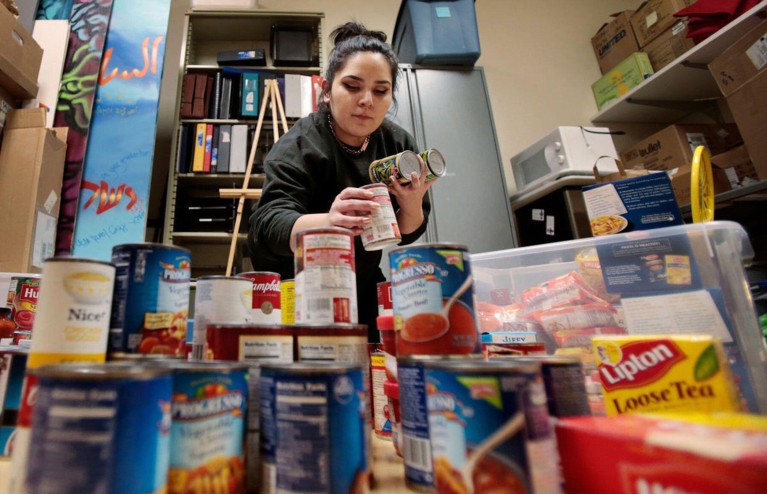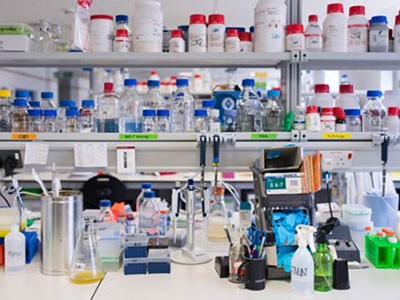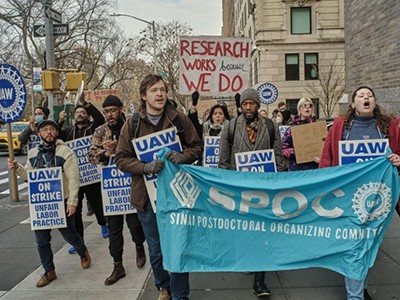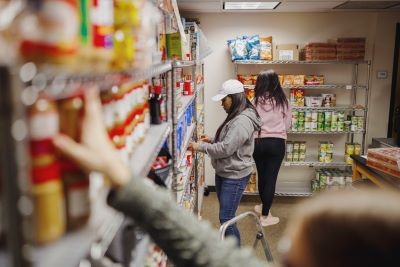[ad_1]

An on-campus food pantry at the University of Wisconsin–Madison helps students with insufficient money for food.Credit: M. P. King/Wisconsin State Journal/AP/Alamy
Jen Cruz’s life as a PhD student is a world away from her childhood. Although not a member of the tribe, she grew up on Yakama Indian reservation land in Wapato, Washington.
Cruz, a first-generation university student, remembers how families, including hers, would often work for local farmers or fishers in exchange for food to supplement the food stamps and free school lunches that most people on the reservation relied on to get by.
Collection: Career resources for PhD students
But once at university, Cruz found that the give and take and sense of community that had helped people to survive just didn’t exist on campus. She relied on food stamps issued by the state during her master’s degree in public health at the University of Michigan in Ann Arbor. “I also took out loans and worked several jobs,” she says. “When the stamps ran out, I’d go to the food pantry.” These are distribution centres where people facing hunger can receive donated food, akin to food banks in other parts of the world.
Now four years into a PhD in social epidemiology at the Harvard T.H. Chan School of Public Health in Boston, Massachusetts, Cruz no longer thinks of herself as food insecure — unable to count on having enough food to be active and healthy — but things are still tight in a city where the cost of living requires a single adult to earn US$62,500 annually to support themselves.
In addition to working full time on her dissertation, she does 20 hours a week as a researcher for a faculty-member colleague, and also teaches to supplement her $37,000 stipend (Harvard will be raising PhD student stipends to a minimum of $50,000 in July). She shops at a discount farmers’ market where she can buy a week’s worth of produce for $10, and she shares accommodation with two other people to minimize housing costs.
Hard evidence
A study published in February revealed that food insecurity at Harvard is not just anecdotal (N. M. Hammad and C. W. Leung JAMA Netw. Open 7, e2356894; 2024). Commissioned by the dean’s office at Harvard’s School of Public Health, the survey found that 17% of the 1,287 graduate students who responded and 13% of the 458 postdoctoral responders had experienced food insecurity — figures that were on a par with or exceeded those for the general US population (13%).
Respondents reported having to skip meals, cut down their portions and fill up on foods with little nutritional value. Some also reported feeling anxious that they wouldn’t have enough to eat. Food insecurity also correlated with respondents feeling that their housing was at risk because of difficulties with rent or mortgage payments
Widespread issue
The struggle to find enough food is a problem not just at Harvard. Food insecurity on campus is widespread in the United States and elsewhere, with one study reporting that 42% of US undergraduate students on average are unable to feed themselves what they need to stay healthy (B. Ellison et al. Food Policy 102, 102031; 2021). To lessen the struggle faced by hungry students, some 750 campuses across the United States have set up food pantries. Research is lacking on food-access issues affecting UK graduate students and postdocs, but a study of 161 UK universities found that food insecurity was “off the scales”, says developmental psychologist Greta Defeyter, who led the work, which is yet to be published. It affected 57% of first-year undergraduate and foundation-year students.
Postdocs celebrate 24% pay boost in one of the world’s most expensive cities
Food insecurity affected 20% of PhD students, “which is much higher than the UK average” of 6–10% of the general population, says Defeyter, who directs the Healthy Living Lab, a food-poverty research group based at Northumbria University in Newcastle.
A 2016 report about food insecurity at the ten campuses of the University of California (UC) system found that 25% of graduate students and 48% of undergraduates didn’t have enough to eat (see go.nature.com/49dedjx).
“We started producing the data to go to the state and say, we have a problem and we need to do something about it,” said Suzanna Martinez, a health-behaviour epidemiologist at UC San Francisco. Martinez led the research in her previous role at the university’s Nutrition Policy Institute in Oakland, California. “Since 2016, the UC system has published updates on food insecurity and actions to address it on its campuses,” she adds. These reports can be accessed online through the university’s Basic Needs Initiative (see go.nature.com/4begaus).
Social stigma
As well as lowering academic performance and increasing the risk of depression, food insecurity is associated with social stigma.
Gwen Chodur, now a postdoc in nutritional biology at UC Santa Cruz, was a key player in the fight for food security while a graduate student in nutrition at the UC Davis. Chodur’s monthly pay in 2016, her first year as a graduate student, was just under $1,700. A first-generation university student who hailed from ‘coal country’ in Pennsylvania, she often skipped lunch as an undergraduate at Pennsylvania State University in University Park. Despite taking on a couple of jobs while there, she says, “I was always one unanticipated expense away from not being able to finish my degree.”
When she started at UC Davis in September 2016, she explains, she didn’t get her first cheque until November, which forced her to get creative with dried beans and rice, or stock up on cans of spaghetti hoops for dinner. “It was very clear to me that higher education wasn’t designed for students like me, and that was very obvious from the first day that I set foot on campus,” she says of the deep-seated sense of impostor syndrome she felt.
PhD students face cash crisis with wages that don’t cover living costs
Chodur soon learnt that many other graduate students had similar struggles. Bolstered by this knowledge, she joined others to launch a separate food pantry, located in the Graduate Student Association office, for colleagues who felt uncomfortable going to the one on campus. “They were saying things like, ‘If I see my students there, that could undermine my authority in the classroom and it would be embarrassing,’” says Chodur.
Safyer McKenzie-Sampson spoke out about the location of the weekly free food market at UC San Francisco. McKenzie-Sampson, who was then a PhD student researching racism and adverse maternal health outcomes in Black communities, says having access to the market was helpful after spending half of her pay on rent. But a return trip to the food market took one hour from the Mission Bay campus, where she lived and worked. “There’d be a group of us with our big green bags collectively doing the walk of shame to the shuttle bus,” she says. Raising the issue repeatedly with her mentor resulted in a second food market opening at the Mission Bay Campus. “She was able to have the right conversations with the right people,” McKenzie-Sampson says.
Even so, McKenzie-Sampson still did not have enough to eat, and often had to track down free food provided at campus meetings. “I don’t know if you have heard of the example of ‘having sleep for dinner’. Well, there definitely were many nights when I had sleep for dinner,” says McKenzie-Sampson, who is now based at Stanford University in California, where she researches racism and ethnicity. She hails from Canada and, like other international students, would at that time have been ineligible for food stamps provided through the state version of the federal Supplemental Nutrition Assistance Program.
Legal help
Legislation introduced in California in 2021 broadened eligibility for food stamps in the state’s undergraduates. But food insecurity in graduate students rose by 14 percentage points between 2021 and 2023, after a fall of 5 percentage points between 2016 and 2021.
“At the end of the day, it’s still the dollar amount that impacts graduate students,” says Martinez, noting that their stipends are too high for them to be eligible for food stamps.
Martinez, who advises on basic necessities operations on UC campuses, also attributes the jump to cost of attendance and increases in the cost of living. She says that the 2023 Basic Needs Initiative survey on food insecurity might have been done before pay hikes for graduate students, which took effect after a long-standing and ultimately successful strike over pay and conditions ended in December 2022. According to the university’s latest report on basic necessities, between 2020 and 2023, the US consumer price index rose by 19% and food prices ratcheted up by 24%.
Next phase
Meanwhile, researchers at Harvard are in the next phase of investigating food insecurity on campus, taking a deeper dive into the details of how graduate students and postdocs are weathering it and what they need. Nour Hammad, a PhD student who researches public-health nutrition and is lead author of the study, says a food pantry is planned. The research continues, she adds, “to see how food insecurity impacts academic performance, their physical and mental health, their relationships — just their whole experience”.
Until recently, Cruz was part of those efforts as leader of the Harvard Chan Alliance for Low Income and First Generation Students Organization, an advocacy group that campaigns for better food access for students in need and serves more broadly as a support system. Group chats announce where on campus students can find free food — usually leftover pizza, sandwiches and fruit from meetings.
“I would say all of us PhD students have Tupperware containers at our desks, so if there is food, we can take extra home,” says Cruz. On the day she spoke to Nature, she had scored some cooked chicken breasts: “I was like, that’s going to be my protein for the week.”
[ad_2]
Source Article Link




